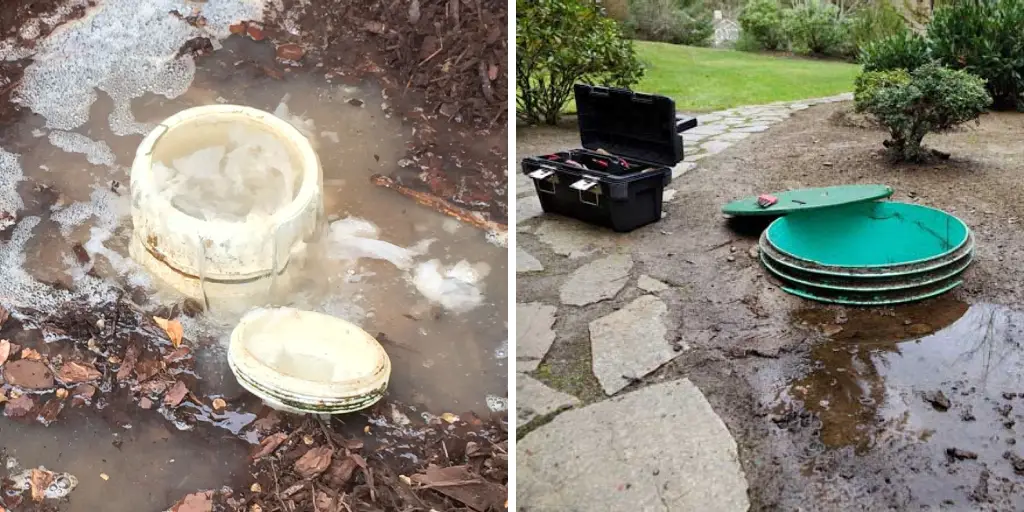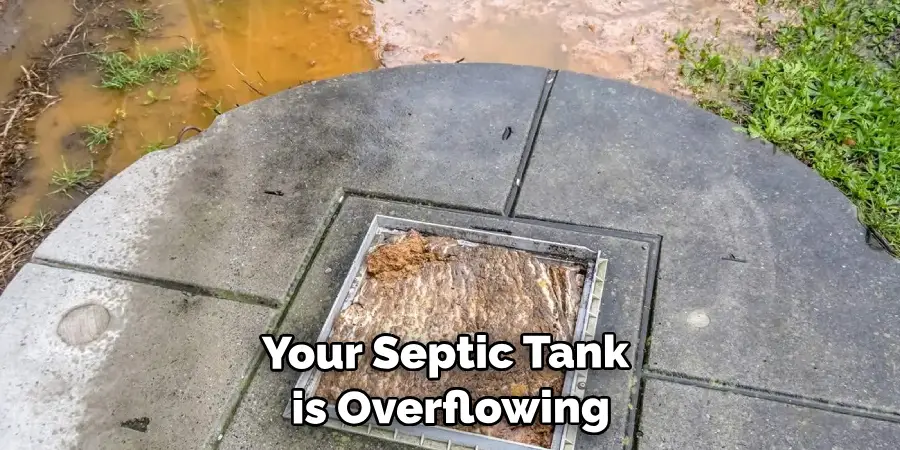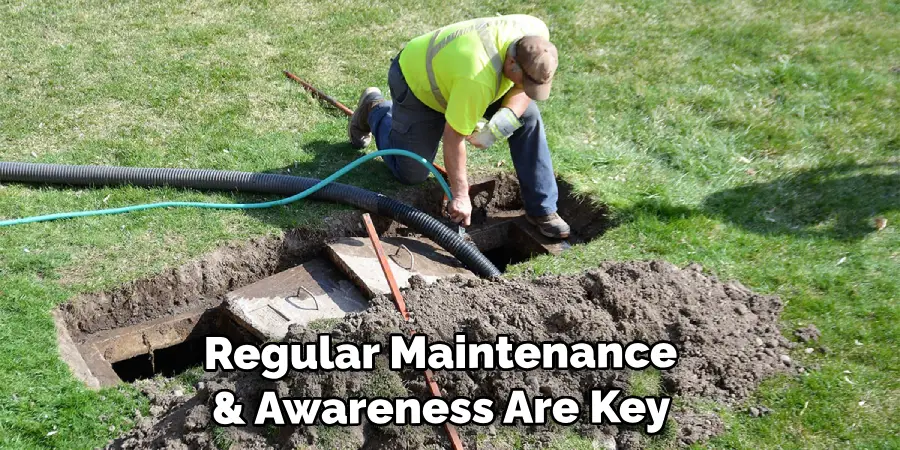Are you worried that your septic tank might be leaking? It’s important to make sure that your septic system is in good working condition, as a leak can cause major damage and expensive repairs. To help prevent this from happening, we’re here to provide you with valuable insights on how to tell if septic tank is leaking. Read on for all the crucial information you need about potential signs of leakage and what steps to take next.

9 Sings on How to Tell if Septic Tank is Leaking
1. Foul Odors:
One of the most obvious signs of a leaking septic tank is a strong, unpleasant odor around your property. If you notice a lingering and persistent sewage smell in or around your home, it could be an indication that your septic system is leaking. This smell can often be compared to the smell of rotten eggs. Keep in mind that a septic tank is supposed to be airtight, so any noticeable odors should raise red flags.
2. Lush and Green Grass:
If you notice an area of your lawn or yard that is unusually lush, green, and thriving compared to the rest of your property, it could be a sign of a leaking septic tank. This happens when the wastewater from your leaking septic tank provides additional nutrients to the grass and plants, making them grow faster and greener.
3. Puddles or Wet Spots:
Another obvious sign of a leaking septic tank is the presence of puddles or wet spots around your property, especially near the septic tank or drainfield. This happens when the wastewater from your septic system is unable to properly drain and instead rises to the surface, creating standing water. This can also attract pests and insects, so make sure to keep an eye out for any unusual wet areas.
4. Slow Draining Fixtures:

If you notice that your sinks, bathtubs, or toilets are draining slower than usual, it could be a sign of a leaking septic tank. This happens when the wastewater is unable to properly flow through the pipes due to a blockage caused by a leak. Keep an eye out for any unusual changes in the water flow and address them promptly.
5. Sewage Backup:
A more serious sign of a leaking septic tank is sewage backing up into your home or yard. This can happen when the septic system is overwhelmed with wastewater due to a leak, causing it to overflow and enter your home. If you notice any sewage backup, it’s important to address the issue immediately to prevent further damage and health hazards.
6. Unusual Sounds:
If you hear gurgling or bubbling noises coming from your plumbing system, it could be a sign of a leaking septic tank. This happens when air bubbles are forced through the pipes due to a leak, causing unusual sounds. If you notice any strange noises, it’s best to have your septic system inspected by a professional.
7. High Water Bills:
A leaking septic tank can also cause a significant increase in your water bills. This happens when the wastewater from your septic system is continuously leaking and requires more water to be pumped into the tank. Keep an eye on your water bills and address any sudden increases promptly. You may want to compare your bills from previous months to see if there is a significant difference.
8. Unpleasant Smells Inside Your Home:

Similar to foul odors outside, a leaking septic tank can also cause unpleasant smells inside your home. If you notice any unusual smells in your bathroom or kitchen, it could be an indication that the septic system is leaking and causing sewage gases to enter your home. This can be a health hazard, so it’s important to address the issue immediately.
9. Age of Your Septic System:
Finally, one of the best ways to tell if your septic tank is leaking is by considering its age. Most septic systems have a lifespan of around 25 years, and as they age, they become more prone to leaks and other damage. If your septic system is nearing the end of its lifespan, it’s important to have it regularly inspected for any signs of leakage.
Following these tips can help you determine if your septic tank is leaking and take the necessary steps to address the issue. Remember, regular maintenance and inspections are key to ensuring the longevity and proper functioning of your septic system. If you suspect a leak or are unsure about the condition of your septic tank, don’t hesitate to contact a professional for assistance. Your investment in preventative measures now can save you from costly repairs in the future. So, pay attention to these signs and be proactive in maintaining your septic system for a worry-free and healthy home!
Additional Tips and Tricks to Tell if a Septic Tank is Leaking
1. If you notice that your septic tank is overflowing, it could be a sign of a leak. This overflow can occur from the lid or cover of the septic tank, indicating that there may be an issue with the seal or gasket.

2. Another way to tell if your septic tank is leaking is to pay attention to any wet spots or pooling water around the area where your septic tank is located. This can be a sign that the tank is not holding all of the wastewater and it is leaking out into the surrounding soil.
3. A strong, foul odor in the area around your septic tank can also indicate a leak or problem. If you notice this smell, it could mean that there is a crack in the tank or a broken pipe that is allowing wastewater and gases to escape.
4. Keep an eye on the vegetation around your septic tank. If you notice any areas of unusually lush or green grass, it could be a sign that the area is being fertilized by leaking sewage.
5. Regularly check the level of water in your toilet bowl. If it seems to be constantly low or if the water is bubbling, it could be a sign of a leak in your septic tank.
6. If you have an aerobic septic system, there may be an alarm that will alert you to any issues or leaks. Make sure to check this alarm regularly and address any warnings immediately.
7. Pay attention to the overall health and maintenance of your septic system. Regularly scheduled maintenance and pumping can help prevent leaks and other problems before they occur.
8. If you suspect that your septic tank is leaking, it’s important to take action immediately. Ignoring the problem can lead to bigger and more costly issues in the future.

By following these additional tips and tricks, you can keep an eye out for any potential leaks in your septic tank and prevent them from becoming larger problems. Regular maintenance and awareness are key to ensuring the health and functionality of your septic system. Remember, if you notice any signs of a leak, it’s important to address it promptly with the help of a professional. So, keep these tips in mind and take care of your septic tank to avoid any issues in the future. Happy maintaining!
Frequently Asked Questions
What Are the Signs of a Leaking Septic Tank?
The most obvious sign of a leaking septic tank is pooling water or wet spots in your yard, especially near the location of your septic system. You may also notice foul odors, slow-draining sinks or toilets, and sewage backups in your home.
How Can I Confirm if My Septic Tank is Leaking?
If you suspect that your septic tank may be leaking, it’s best to call a professional for an inspection. They will use specialized tools and techniques to determine if there is a leak in your system. This may include conducting a dye test, using a camera to inspect the inside of your pipes, or performing a pressure test.
What Causes Septic Tanks to Leak?
There are several reasons why septic tanks can develop leaks. Some of the most common causes include tree root intrusion, damaged pipes or fittings, and deterioration of the tank itself due to age or lack of maintenance. Heavy rains or flooding can also cause a septic tank to leak if it becomes overloaded with water.
How Can I Prevent a Septic Tank Leak?
Regular maintenance is key to preventing leaks in your septic system. This includes having your tank pumped every 3-5 years, being mindful of what you flush down the toilet or pour down the drain, and avoiding planting trees or shrubs near your septic system. Installing a drain field liner can also provide an extra layer of protection against leaks.
What Should I Do if My Septic Tank is Leaking?
If you suspect that your septic tank is leaking, it’s important to take action immediately. Contact a professional septic service provider to schedule an inspection and repair any damage as soon as possible. Continuing to use your septic system while it is leaking can lead to further damage and costly repairs.
Conclusion
All in all, knowing how to tell if septic tank is leaking is an important part of maintaining your septic system. By understanding the signs and causes of a leak, you can take proactive steps to prevent it from happening in the first place. Regular maintenance and prompt repairs are key to keeping your septic tank functioning properly and avoiding any potential health hazards or costly damage to your home.
If you have any further concerns or questions about your septic system, don’t hesitate to reach out to a professional for assistance. So, always be aware of the signs and symptoms of a leaking septic tank and take action as soon as possible to keep your home safe and your septic system functioning properly.

